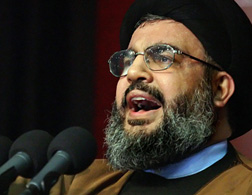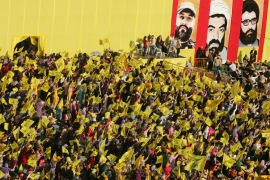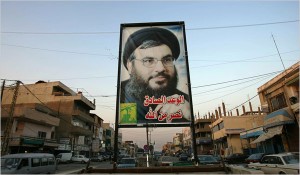Haaretz reviews APTD
The esteemed weekend Haaretz has reviewed A Privilege to Die, recommending the book to Westerners, and in particular Israelis, because it contains insights into Hezbollah that might well make readers uncomfortable. (Disclosure: the reviewer, mystery writer Matt Beynon Rees, is a friend.) He compares my book to David Hirst’s Beware of Small States.
The essence of the Shi’ite organization’s success, as Cambanis sees it, is its ability to carve out clear answers to Lebanon’s vital national questions. That gives it a big advantage over the cloudy mass of Lebanon’s other vicious sectarian parties. One voter tells Cambanis that his choice of Hezbollah was based on the fact that he was “sick of all these other assholes.”
Read the rest of the review here.
http://www.haaretz.com/culture/books/middle-east-into-the-heart-of-hezbollah-1.336038
Foreign Affairs Review
A brief mention of A Privilege to Die in the latest issue of Foreign Affairs:
Cambanis’ intimate account of this recent history, enhanced by stories of a handful of Hezbollah’s true believers and sympathizers, paints a gripping portrait of this radical religio-political movement.
Hitchens on Hezbollah
 Christopher Hitchens on Slate laments Hezbollah’s renaissance in Lebanon. He blames two main factors: Israel’s “crass intervention in Lebanon in 2006,” and the United States unwilligness to take an interest in Lebanon. To his list I’d add a few other reasons: the absence of a coherent and compelling alternative to the “Axis of Resistance”; massive corruption and/or incompetence among so-called moderates; and the puzzling failure of non-militant movements to use religion to mobilize mass support.
Christopher Hitchens on Slate laments Hezbollah’s renaissance in Lebanon. He blames two main factors: Israel’s “crass intervention in Lebanon in 2006,” and the United States unwilligness to take an interest in Lebanon. To his list I’d add a few other reasons: the absence of a coherent and compelling alternative to the “Axis of Resistance”; massive corruption and/or incompetence among so-called moderates; and the puzzling failure of non-militant movements to use religion to mobilize mass support.
Very kindly, Hitchens also mentions A Privilege to Die:
A depressingly excellent book on the contours of that new reality is provided by Thanassis Cambanis. A Privilege To Die lays out the near-brilliant way in which Hezbollah manages to be both the party of the downtrodden and the puppet of two of the area’s most retrograde dictatorships. Visiting Beirut not long after Hezbollah had been exposed as an accomplice to Syria and as the party that had brought Israel’s devastating reprisals upon the innocent, I was impressed, despite myself, by the discipline and enthusiasm of one of Nasrallah’s rallies in the south of the city. Cambanis shows how the trick is pulled. With what you might call its “soft” power, the Party of God rebuilds the shattered slums, provides welfare and education, and recruits the children into its version of a Boy Scout movement, this time dedicated to martyrdom and revenge. With its “hard” power, it provides constant reminders of what can happen to anyone who looks askance at its achievements. Its savvy use of media provides a continual menu of thrilling racial and religious hatred against the Jews. And its front-line status on Israel’s northern frontier allows it to insult all “moderate” regimes as poltroons and castrati unwilling to sacrifice to restore Arab and Muslim honor. Many Sunni Arabs hate and detest Hezbollah, but none fail to fear and thus to respect it, which Nasrallah correctly regards as the main thing.
The Human Face of Hezbollah
![]() David Shribman reviewed A Privilege to Die in today’s Boston Globe. It’s an honor to be reviewed by such a heavyweight (David won a Pulitzer for his Washington reporting at the Globe, and now edits the Pittsburgh Post-Gazette; I don’t know him personally.)
David Shribman reviewed A Privilege to Die in today’s Boston Globe. It’s an honor to be reviewed by such a heavyweight (David won a Pulitzer for his Washington reporting at the Globe, and now edits the Pittsburgh Post-Gazette; I don’t know him personally.)
From the review:
Where some writers talk about the Arab streets, Cambanis has walked them. Along the way he encountered warriors and hospital workers, polished intellectuals and women who sell nuts by the curb, ideologues and theologians, those who engage in small acts of resistance and those who prosecute total war of the most brutal sort. …
What becomes clear is that the key to Hezbollah is its ability to spread virtue along with the violence. It promises, for example, to restore communities — homes and businesses — to their original conditions after each episode of conflict. “Hezbollah needed to keep [its] soft supporters happy,’’ Cambanis writes, “and to do so it needed to deliver bricks and mortar along with its ideology.’’
Rapture, Resistance, Revolution
 In his review of A Privilege to Die for Global Post my friend the mystery writer (and veteran Middle East hand) Matt Beynon Rees calls attention to one the main endeavors of the book: to place front and center the regular Joes and Janes (or Ranis and Farahs) that have elevated Hezbollah into a perennial and expanding trend-setting militant movement.
In his review of A Privilege to Die for Global Post my friend the mystery writer (and veteran Middle East hand) Matt Beynon Rees calls attention to one the main endeavors of the book: to place front and center the regular Joes and Janes (or Ranis and Farahs) that have elevated Hezbollah into a perennial and expanding trend-setting militant movement.
Hezbollah’s rank-and-file, the footsoldiers and volunteers, aren’t always scheming against Israel or dreaming of perpetual war; they’re also strivers looking for better jobs, education for their kids, and a more honest relationship with God.
Because of its growth and success on the battlefield, the Party of God itself often takes on mythic status. Outsiders sometimes impute far greater cunning, skill and sophistication to Hezbollah than its occasionally clunky and authoritarian behavior merits.
Matt re-tells one of the more amusing encounters I had with Hezbollah while reporting the book:
Unsatisfied with one of his stories, Hezbollah officials denied his book the cooperation of the Party of God (“Hizb” means party in Arabic; “Allah” you probably heard of already.) He describes one party functionary telling him, “‘You can’t possibly write a book about Hezbollah without the party’s permission, right? You’ll have to move on to another project?’ Like many Hezbollah officials she overestimated the party’s ability to control or manipulate a foreigner like me and she thought the prospect of future access would tempt me to relinquish writing this book.”
NYT reviews PTD
 Just posted, Joe Klein’s review in The New York Times Book Review.
Just posted, Joe Klein’s review in The New York Times Book Review.
Klein opens his review, entitled “The Hezbollah Project,” recounting an episode from the book about Hezbollah’s seamlessly-run intake shelter in a Beirut parking garage, to receive people fleeing the war in south Lebanon.
A metaphor, of course: Hezbollah has created a national bomb shelter in the southern half of Lebanon. Its followers are fed and cared for, and they are devoted in a cultlike way, even though many have lost family members, homes and their livelihoods because of Hezbollah’s foolish bellicosity. It is a perverse triumph. Cambanis argues, persuasively, that Hezbollah represents the most successful radical Islamist movement in the region. He also tells a story that hasn’t been told with this much attention to detail by a Western reporter before.
It’s quite a complimentary review, despite a late jab at some repetitive phrasing in chapter 1 (my commissioning editor takes full responsibility for not catching and scrubbing those early passages!).
CSM reviews PTD
Rayyan Al-Shawaf reviews A Privilege to Die in the Christian Science Monitor. He writes:
In 2006, Hezbollah launched an unprovoked attack on Israel, which retaliated massively. This war and its aftermath set the stage for the author’s searching probe into the hearts and minds of Hezbollah’s rank and file. In prose that is often eloquent yet earthy, indicative of scholarly erudition as well as a storyteller’s flair for capturing the complexities of human psychology, Cambanis describes the seemingly contradictory impulses he discovers. Consider the case of 20-something Aya Haidar, who longs for martyrdom – preferably in the throes of the soon-to-return Mahdi’s (Messiah’s) war against infidels – but simultaneously wants to marry the man she loves and start a family. Observes Cambanis: “She was a Mahdist, a Hezbollah cadre, a schoolteacher fresh out of college, and a young girl in love, rolled into one bristling ball of energy.”
He goes on to argue that the book underestimates the scope of Shia dissatisfaction with and Sunni fury toward Hezbollah, a “chink in the party’s armor” that suggests Hezbollah has at most one more war left in it. I think Rayyan (whom I don’t know personally) is right to call attention to the growing frustration with Hezbollah. On my most recent reporting trip to Lebanon in September, I found the country more polarized than ever: Hezbollah’s supporters bristling, and its detractors less sympathetic than ever toward the Party of God’s militarism.
What we can’t predict is whether another war will conclusively diminish Hezbollah, as Rayyan writes, or whether it will once again restore the party’s luster and dominant position, as it did after the 2006 war, to the surprise of so many people.
Kirkus Reviews on PTD
Kirkus Reviews published a review of A Privilege to Die on August 1.
If there’s anything to unite the Arab world, it’s opposition to Israel. If there’s a group to do that unifying, writers former Boston Globe Middle East bureau chief Cambanis, it’s the much-feared Hezbollah, the Party of God.
Hezbollah, writes the author, makes for a complex, frightening enemy that has “put back into popular currency a notion that had lain in tatters since 1967: that Arab forces could do more than terrorize or harass Israel—they could defeat and destroy it. That promise of quick resolution, paradoxically, follows a long and patient process of outwaiting its Israeli foe, slowly building a unified, militant front and sniping at the edges, though unafraid to take on the full might of the Israeli Defense Forces, as in the short-lived but brutal Lebanon war of 2006. Centered in Lebanon but with ties to Iran and Syria, Hezbollah owes much of its success to its secretary general, Sayyed Hassan Nasrallah, who, writes the author, “commands more popularity in the Middle East than any other leader.” Nasrallah has taken his organization from the fringe to the center of regional politics, both as an army and as a political force, offering followers a “heady mix of religion, self-improvement, and self-defense that translated into a sustained wave of toxic and powerful militancy.” That militancy is expressed in suicide bombings and other acts of terror, but Cambanis does not sensationalize. Such things are mere tactics, but if Hezbollah is on the whole less anti-Semitic than rival Arab groups, that does not lessen its irrevocable commitment to destroy Israel even as it is “willing to negotiate most other issues” in the interest of practical politics, a stance that gives it a veneer of respectability in the tumult of regional power struggles.
Hezbollah is a formidable presence that cannot be ignored, and Cambanis’s book, a well-balanced blend of journalism, history and geopolitical primer, is a significant aid to understanding it.
Publisher’s Weekly starred review
My first official critical feedback came in today from the trade magazine Publisher’s Weekly, which gave A Privilege to Die a starred review.
Publisher’s Weekly
Posted June 28, 2010
Starred ReviewA Privilege to Die: Inside Hezbollah’s Legions and Their Endless War Against Israel
Thanassis Cambanis, Free Press, $27 (304p) ISBN 978-1-4391-4360-5
American journalist Cambanis has spent much of the last decade observing the Middle East from within its most intractable struggles, most notably while on the front lines of Israel’s 2006 war with Hezbollah. The extremist Shi’ite organization is notorious for not granting high-level access to Western journalists and for tightly controlling whatever lower-level representatives might say, but Cambanis spent three years getting past the script “to write with humanity about reviled characters.” Interviewing fighters in the field, nurses tending to the wounded, refugees on the road, and think-tank pundits enabled him to probe the real motivations, histories, and ambitions of Hezbollah’s followers and better understand their devotion to “war without end” and an “ideology designed to rebound and flourish under assault.” As such, Cambanis provides crucial insights to those who might hope to counter Hezbollah’s increasing power and influence in the region, as well as an important reminder that in any war, one’s enemies are human. (Sept.)

